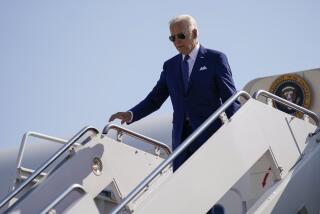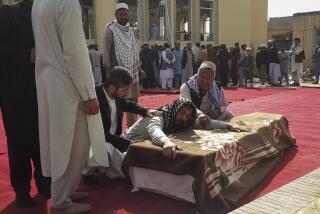Obama meets with Afghan president Ghani, hints at pushback of U.S. withdrawal
- Share via
Reporting from Washington — President Obama is expected to disclose Tuesday if he will withdraw most U.S. troops from Afghanistan on schedule this year, or keep 9,800 troops and thousands of contractors there through 2016, when the president insists America’s longest war should finally end.
White House officials hinted strongly that Obama will push back the deadlines for the U.S. withdrawal after he meets with the new Afghan president, Ashraf Ghani, who is making his first official visit to Washington since he was elected last September.
Ghani is pressing Washington to keep the full U.S. military force there through next year, and longer if possible, to support Afghan security forces fighting a resurgent Taliban insurgency. Ghani also is seeking long-term finanical aid.
“Our partnership with the United States is foundational because we will be the first line of defense for freedom globally,” Ghani said Monday at the Pentagon after meeting with Defense Secretary Ashton Carter.
Obama administration plans call for cutting the U.S. force in Afghanistan to about 5,500 troops by the end of this year, and to an embassy-based force of about 1,000 by the time Obama leaves office in early 2017.
White House officials say they don’t expect Obama to shift that final goal, but it’s likely he will slow the planned withdrawal this year and leave most U.S. troops for another 18 months or so.
Administration officials told reporters in a conference call Friday that the administration wants to be “responsive” on Ghani’s request to extend the U.S. military presence.
“So absolutely, we expect some discussion about President Ghani’s request for flexibility” on the troop drawdown, said Jeff Eggers, a senior advisor on Afghanistan and Pakistan in the National Security Council.
The White House sees Ghani as a welcome change after years of fractious, icy relations with Hamid Karzai, the former Afghan president, who often was harshly critical of U.S. aims and policies.
Ghani, who spent 15 years in Washington at the World Bank, is more attuned to international norms of diplomacy. He is seen as a financial technocrat more than a politician, and his coalition government emerged only with help from Secretary of State John Kerry.
His call to ease the deadlines for withdrawing U.S. troops has resonated with defense hawks in Congress who warn that pulling American troops out too quickly could leave the fragile country vulnerable, once again, to insurgents or terrorist groups.
Sen. John McCain (R-AZ) and Sen. Lindsey Graham (R-SC) issued a joint statement Monday urging Obama to abandon “arbitrary calendar dates – rather than conditions on the ground – for the final U.S. withdrawal from Afghanistan.”
Ghani’s request also has found support in the White House. Obama does not want Afghanistan to go the way of Iraq, where the government in Baghdad struggled to stem growing sectarian violence and instability after the U.S. military pullout in 2011.
The White House has sent more than 3,000 U.S. military personnel back to Iraq as advisors and trainers since last summer to help defeat the Islamic State militants who invaded from Syria last spring and captured about a third of Iraqi territory, including several major cities.
U.S. Army Gen. John F. Campbell, top U.S. commander in Afghanistan, sent fresh recommendations to the White House several weeks ago about enhancing the training mission, counter-terrorism capabilities and security for the remaining U.S. personnel in the country.
U.S. forces no longer engage in combat in Afghanistan, and American casualties have dropped sharply. Most of the 9,800 troops still there are involved in training Afghan forces on fortified bases, although special operations teams still conduct occasional raids against suspected terrorists.
Taliban attacks intensified last summer and fall in Afghanistan as the U.S. and its allies closed hundreds of bases and turned over responsibility for most combat operations to Afghan security forces, which suffered heavy casualties.
About 2,215 U.S troops have been killed, and more than 20,000 have been wounded, since the U.S.-led invasion of Afghanistan in late 2001.
Follow @wjhenn for military and defense info.
More to Read
Sign up for Essential California
The most important California stories and recommendations in your inbox every morning.
You may occasionally receive promotional content from the Los Angeles Times.











